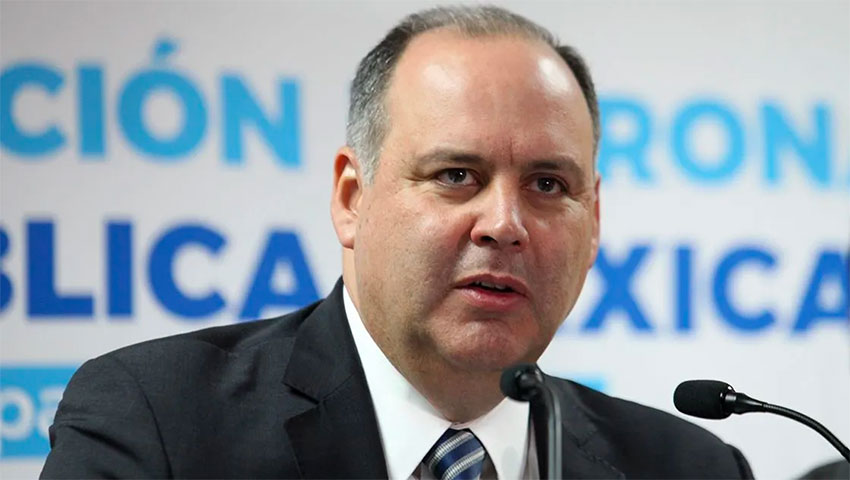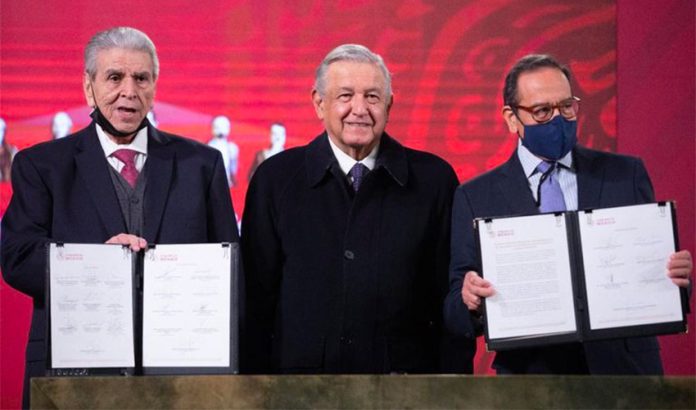Business groups are divided over a new agreement on outsourcing and subcontracting announced by the federal government on Wednesday.
President López Obrador and representatives of the private sector and the union movement signed an agreement under which they committed to improving a proposal to ban outsourcing without prior government authorization.
Carlos Salazar, president of the Business Coordinating Council (CCE), which represents 12 business groups, declared at the president’s news conference Wednesday morning that the private sector was happy with the agreement.
But three private sector groups that are part of the CCE – the National Chamber for Industrial Transformation (Canacintra), the Mexican Employers Federation (Coparmex) and the National Agricultural Council (CNA) – later said they opposed it.
Labor Minister Luisa María Alcalde said the agreement is made up of four accords.
Firstly, the government, the private sector and the union movement committed to put an end to the abuse of subcontracting. (Many workers are routinely dismissed at the end of the year because companies want to avoid paying legally required bonuses and other benefits to employees as well as prevent them from accumulating seniority.)
Secondly, the parties committed to including a fair and equitable profit sharing scheme in an improved outsourcing proposal to be considered by the Congress.
Thirdly, on the request of the private sector Congress agreed to postpone debate of the updated proposal until February 2021. (López Obrador sent his original proposal to Congress last month).
Fourthly, the parties agreed to the issuance of a call to companies to put an end to outsourcing practices that are detrimental to workers such as mass end-of-year dismissals. The Mexican Social Security Institute (IMSS), the National Workers Housing Fund (Infonavit) and the Federal Tax Administration will be responsible for making the plea and will take legal action against any companies found to be committing crimes related to outsourcing.
Alcalde said that the agreement is a sign of the government’s commitment to resolve differences with the private sector, which argued that the proposal presented by López Obrador last month discourages job creation and threatens economic growth.
The president thanked the private sector and union movement for entering into the agreement.

Salazar said the deal opens the way to more dialogue about outsourcing with both the government and workers.
“The business community will never defend any irregularity [in the use of outsourcing],” the CCE chief said.
“… [We will] arrive with better proposals for the good of the country. We have to celebrate that we can be seated at the dialogue table with representatives of workers and the authorities. I’m sure that a better proposal will be presented in the end,” Salazar said.
Carlos Aceves, general secretary of the Mexican Workers Confederation, said that workers’ conditions won’t be improved with “the stroke of a pen” but opined that working with the government and the private sector is a good idea.
“We don’t think the same but we understand each other. … We’re convinced this [agreement] is for the good of the workers,” he said.
But Canacintra, Coparmex and the CNA said in a joint statement that they don’t support the agreement.
They said it “preserves the idea of substantially prohibiting the activity of subcontracting,” only allowing it in specialized areas.
“We also reject the stigmatization of the business sector as the architects of non-compliance with tax and labor obligations,” the three groups said.
“The substantial responsibility for irregular activities that have occurred in the past rests with the lack of adequate supervision by authorities such as the Federal Tax Administration, the Labor Ministry, Infonavit and IMSS.”
The three organizations said that restricting outsourcing and subcontracting would threaten the creation and preservation of formal sector jobs, force businesses to close and reduce Mexico’s competitiveness.
It’s “absurd” to blame the abuse of outsourcing on all companies when “an absolute minority” of them have done the wrong thing, they said.
“We want to make it clear that we are in favor of legal practices that encourage the creation of jobs. … We reiterate our willingness to maintain open and frank dialogue” with the president and both houses of Congress “to achieve a law that gives priority to our position on this matter: regulation yes, prohibition no,” the business groups said.
“This dialogue must be held under the premise that subcontracting, being a legal and appropriate activity, must respect the freedom of workers and companies to sign contracts without restrictions and as best suits their interests,” they said.
“This hiring freedom must be allowed without limits other than companies’ compliance with tax and social security obligations … in such a way that workers hired under … [subcontracting or outsourcing arrangements] can fully exercise their rights.”
Source: Milenio (sp)
